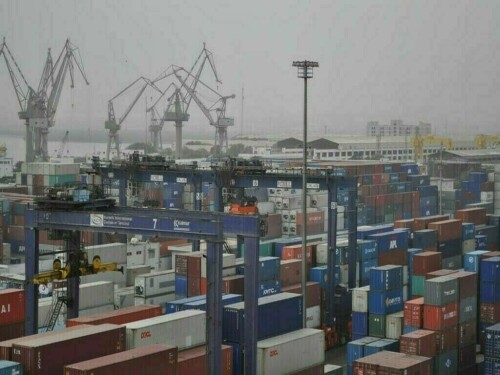Government Finalizes Recommendations to Reduce Port Congestion
The government has concluded a series of recommendations designed to decrease container dwell time at Karachi Port and Port Qasim, intending to boost cargo clearance effectiveness and alleviate overcrowding at the nation’s two major maritime hubs.
A high-powered committee presented these suggestions to the Federal Minister for Maritime Affairs, Muhammad Junaid Anwar Chaudhry, on Tuesday, according to an official statement from the Ministry of Maritime Affairs.
Anwar has instructed that these recommendations be immediately submitted to the Federal Board of Revenue (FBR), tasking them with formulating an execution strategy within a fortnight.
The committee, initiated by Anwar and led by Umer Zafar Sheikh, Additional Secretary of the Ministry of Maritime Affairs, includes representatives from the Karachi Port Trust (KPT), Port Qasim Authority (PQA), Pakistan Customs, terminal operators, FBR, and other concerned parties.
During the session, the federal minister highlighted that the plan seeks to harmonize Pakistan’s port activities with international standards, facilitating quicker clearances, streamlined trade operations, and diminished operational expenditures.
He also reorganized the committee, designating it as an implementation body responsible for liaising with the FBR and overseeing advancements within the stipulated timeframe.
The statement noted, “The proposals concentrate on resolving challenges throughout the clearance process, ranging from holdups in submitting goods declarations, assessment, and laboratory analyses, to problems concerning transportation, inspection, auctioning, and exit procedures.”
Key Measures for Improvement
KPT Manages Record Cargo Volume in FY25.
- Encouraging early or pre-arrival filing of goods declarations.
- Reducing the filing timeframe.
- Implementing penalties for late submissions.
The committee has proposed virtual hearings to expedite assessment processes. Furthermore, the adoption of advanced screening technologies and increased laboratory resources has been suggested to minimize testing durations.
According to the statement, “To alleviate congestion at terminals, the committee has advocated for quicker auctioning and removal of long-staying cargo, expansion of storage capabilities, and increased deployment of personnel and customs inspectors.”
Additionally, it has been proposed to operate customs assessments, inspections, laboratory services, and shipping services around the clock. Enhancements to transportation encompass extending bonded transit, simplifying tracker installation, adding escort personnel, and removing nighttime restrictions on large vehicles.
The committee emphasized that infrastructure development strategies should prioritize truck holding zones, dedicated rail cargo routes, and integrated transport networks to decrease dependence on roadways.
Digital transformation is another essential element of the plan, featuring proposals for AI-driven risk assessment of importers, a specific stakeholder platform within the WeBOC system, online auction capabilities, and instant communication channels connecting terminals, traders, and transporters.
The committee has also suggested shortening the free container period for green and yellow channels from five to three days, enforcing strict exit timelines, and imposing penalties for non-compliance.



Comments (0)
No comments yet. Be the first to comment!
Leave a Comment